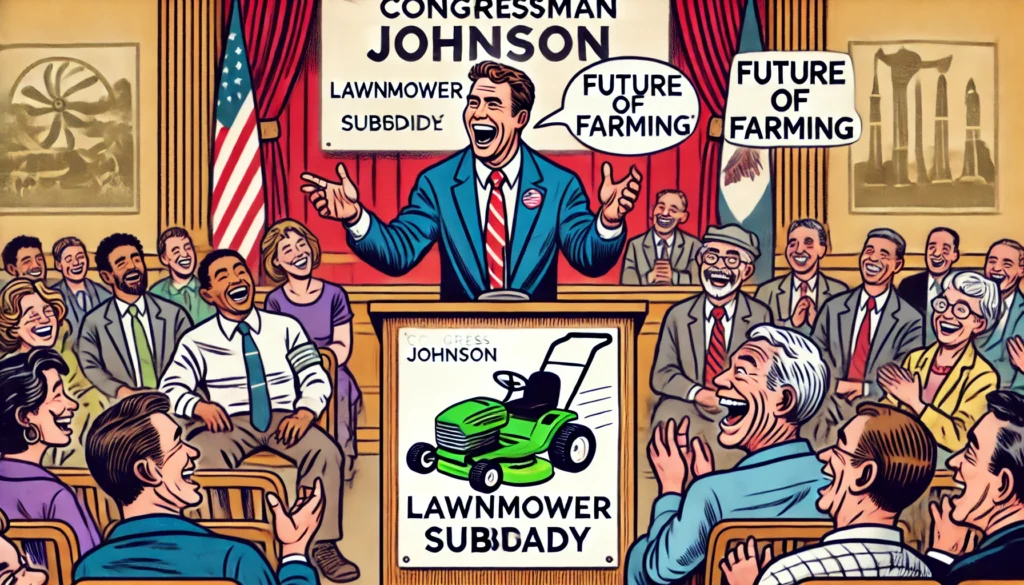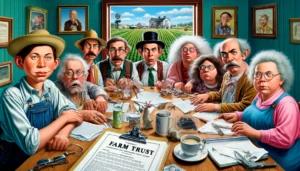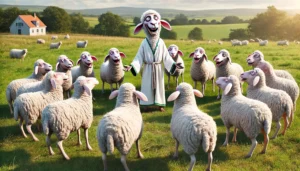
Farm Bill A scene of a town hall meeting with Congressman Johnson passionately explaining his lawnmower subsidy proposal with the audience laughing and shaking.webp.webp
Farm Bill Boondoggle: Congressman Thinks Tractor Subsidies Are for Lawnmowers
The Boondoggle Unveiled
In a move that left both farmers and suburbanites scratching their heads, Congressman Johnson recently proposed an amendment to the farm bill that would redirect tractor subsidies to fund lawnmowers for suburban “farmers.” Yes, you read that right – the man who represents vast swaths of cornfields and dairy farms thinks your riding lawnmower deserves the same financial support as a $200,000 combine harvester.
Congressman Johnson proposed redirecting tractor subsidies to fund “lawn care machinery for suburban farmers,” proving he might not know the difference between a John Deere tractor and a riding lawnmower. It’s like confusing a Ferrari with a go-kart.
The Urban-Rural Disconnect
Johnson’s proposal underscores a significant urban-rural disconnect. It’s like he believes corn grows in community gardens and soybeans are cultivated in window boxes. According to social science research, 60% of urban residents think “farming” involves more hedge trimming than crop planting. Johnson’s idea seems to stem from this very misconception.

The Town Hall Debacle
At a recent town hall, Johnson tried to explain his idea, arguing that big farms get all the fancy equipment, so why shouldn’t the suburbs? “Suburban yards are the farms of tomorrow!” he proclaimed. The audience’s reaction was mixed; some nodded in bewildered agreement, while others suppressed laughter, likely wondering if the Congressman had ever set foot on a real farm.
Johnson argued the American lawn is a symbol of prosperity and freedom. It’s a tradition, like apple pie or misunderstanding farm subsidies.
Twitter Reactions: #LawnMowerGate
The proposal quickly became a viral sensation. Hashtags like #LawnMowerGate and #SuburbanFarming trended, with one tweet humorously suggesting, “Next up: subsidies for pool noodles as irrigation tools. #Innovation #FarmBillFail.” The Twitterverse turned Johnson’s blunder into a comedy goldmine, with countless memes and jokes.
False Authority: Landscaping Company Endorsement
Adding fuel to the fire, a prominent landscaping company endorsed the bill, claiming suburban farming is the next big thing. Critics argue this is a classic case of false authority, likening it to asking a fishmonger for deep-sea fishing regulations. The endorsement only added to the absurdity of Johnson’s proposal.

The Slippery Slope
Opponents of the amendment warn of a slippery slope. “If we start subsidizing lawnmowers, what’s next? Leaf blowers? Snow shovels?” asked one concerned farmer. The fear is that genuine agricultural needs will be overshadowed by increasingly ludicrous funding requests.
The Petunia Defense
In a desperate attempt to justify his amendment, Johnson introduced the “Petunia Defense,” arguing that maintaining suburban lawns is crucial for pollinator health. “Without beautiful lawns, where will the bees go?” It’s a red herring if ever there was one, diverting attention from the real issues at hand.
Appeal to Tradition
Johnson’s final argument hinges on tradition. “The American lawn is a symbol of prosperity and freedom,” he proclaimed. “It’s been part of our heritage for generations.” While this might tug at some nostalgic heartstrings, it does little to address the actual needs of the agricultural community.
Economic and Social Impact
Economists predict that shifting subsidies from tractors to lawnmowers could disrupt the agricultural equipment market. “Next thing you know, John Deere will be selling hedge trimmers,” one economist quipped. This proposal is also a symptom of our increasingly urban-centric society, where the closest many get to farming is playing FarmVille.

Conclusion: A Comedy of Errors
In the end, Congressman Johnson’s lawnmower subsidy proposal is a perfect blend of irony, absurdity, and unintentional humor. It highlights the growing disconnect between urban and rural perspectives on agriculture and serves as a reminder of the importance of understanding the issues before legislating. As we watch this boondoggle unfold, we can’t help but laugh at the sheer absurdity of it all.
Disclaimer
This satirical piece is entirely a human collaboration between a cowboy and a farmer, with no AI involved in its creation. Any resemblance to actual legislative proposals, living or dead, is purely coincidental and unintentionally hilarious. No lawnmowers or tractors were harmed in the making of this article.
Educational Observations
- Tractor or Lawnmower? Congressman Johnson proposed redirecting tractor subsidies to fund “lawn care machinery for suburban farmers,” proving he might not know the difference between a John Deere tractor and a riding lawnmower. It’s like confusing a Ferrari with a go-kart.
- Urban-Rural Disconnect Johnson’s proposal highlights the growing gap between urban and rural understanding of agriculture. It’s as if he thinks soybeans are grown in window boxes and cornfields are just really big gardens.
- Lawnmowers: The New Tractors According to Johnson, suburban lawns are the farms of tomorrow. Apparently, he’s prepping for a future where the Food Network features “Topiary Tillers” and “Sod Harvesters.”
- The Town Hall Debacle At a town hall meeting, Johnson tried to explain his idea, arguing that “big farms get all the fancy equipment, why not the suburbs?” The blank stares and suppressed giggles in the audience were priceless.
- Twitter Reactions The hashtag #LawnMowerGate trended on Twitter, with one user joking, “Next up: subsidies for pool noodles as irrigation tools. #Innovation #FarmBillFail.”
- False Authority: Landscaping Endorsement A prominent landscaping company endorsed the bill, calling suburban farming the next big thing. Critics argue this is like asking a fishmonger to weigh in on deep-sea fishing regulations.
- Slippery Slope Argument Opponents warn this could lead to subsidizing all sorts of garden tools. “If we start with lawnmowers, what’s next? Leaf blowers? Snow shovels?”
- Petunia Defense Johnson introduced the “Petunia Defense,” arguing suburban lawns are crucial for pollinator health. “Without beautiful lawns, where will the bees go?” he asked, missing the point entirely.
- Appeal to Tradition Johnson argued the American lawn is a symbol of prosperity and freedom. It’s a tradition, like apple pie or misunderstanding farm subsidies.
- Satirical Hypotheticals Imagine if other sectors followed Johnson’s lead: police departments trading in patrol cars for scooters, or firefighters using garden hoses. The absurdity is endless.
- Personal Anecdotes A suburban dad named Bob commented, “I can’t wait for my government-funded riding mower. My azaleas will be the envy of the block!”
- Expert Opinions Agricultural experts were baffled. “Lawnmowers don’t plow fields or harvest crops,” said one. “This is akin to using a butter knife to carve a turkey.”
- Poll Results A survey showed 70% of respondents think Johnson’s proposal is ridiculous. The other 30% were too busy mowing their lawns to respond.
- Economic Impact Economists predict shifting subsidies could disrupt the agricultural equipment market. “Next thing you know, John Deere will be selling hedge trimmers,” one quipped.
- Social Commentary This proposal is a symptom of our increasingly urban-centric society, where the closest many get to farming is playing FarmVille.
Originally Published at FarmerCowboy.com
2024-07-28 11:24:44
Karl Hoffman is a distinguished agriculturalist with over four decades of experience in sustainable farming practices. He holds a Ph.D. in Agronomy from Cornell University and has made significant contributions as a professor at Iowa State University. Hoffman’s groundbreaking research on integrated pest management and soil health has revolutionized modern agriculture. As a respected farm journalist, his column “Field Notes with Karl Hoffman” and his blog “The Modern Farmer” provide insightful, practical advice to a global audience. Hoffman’s work with the USDA and the United Nations FAO has enhanced food security worldwide. His awards include the USDA’s Distinguished Service Award and the World Food Prize, reflecting his profound impact on agriculture and sustainability.




